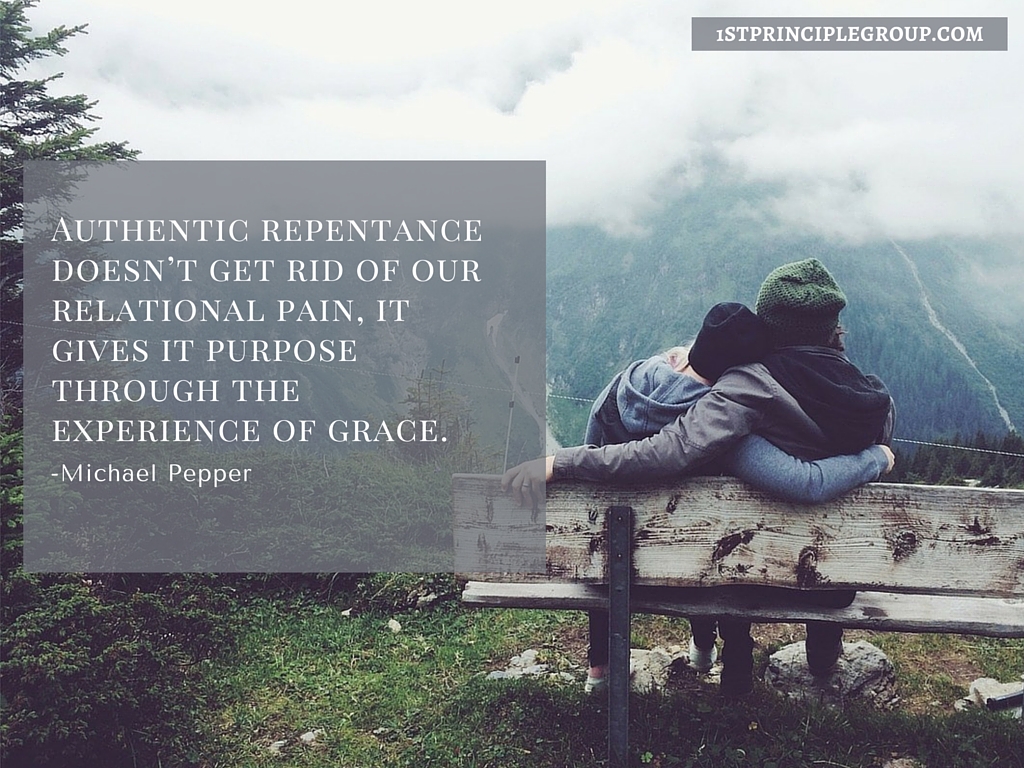The Power of Relational Repentance

“If you are renewed by grace, and were to meet your old self, I am sure you would be very anxious to get out of his company.” -Charles Haddon Spurgeon
“I’m sorry...I can see how I hurt you.”
I say this often to my wife. And I really mean it when I do. When she tells me that I’m being negative or short with her, I’ll take a minute, collect my thoughts and realize she has a point, and then apologize. Any questions about marriage? I’d be happy to fill you in on how great I am at it.
I was told in college that you should never apologize for how someone feels. In other words, if you tell me ‘hey, that really hurt…’ I should not respond with ‘I’m sorry you feel that way’ because I would not be apologizing for what I did, I’d be apologizing for the feelings you feel (and thereby escaping that I did anything wrong). This was impactful to me as a relationally eager, but ignorant, 19 year old. I decided I wanted to be someone who directly apologized for what I did and took a second to think about what was being asked of me.
A New Way of Repentance
I had another impactful moment this past week listening to the teaching of Dr. Larry Crabb. He spoke of repentance in a new way, a way that again, revealed how little I understand of being in relationship with people.
I would say my ‘new’ way of repentance that I began practicing in college was still primarily a behavioral repentance. “I’m sorry I did something to you.” If I approach you with this mindset, the goal of repentance is to move past the offending moment. Whether or not I am even aware of it, most times I’m saying ‘I’m sorry...I can see what I did there…’ deep down I’m just wanting the moment to be over...I want us to feel like normal again.
This new(er) repentance I’ve learned is primarily a relational repentance. It comes at a deeper cost to me...one that will not allow me to move quickly past the offending moment...a cost that I will feel and have to contend with. When we consider our brokenness not just in behavioral terms, but in relational terms, repentance should shift to being relational, rather than transactional. In other words, behavioral repentance says “I want to make this right, so I’ll say I’m wrong, are we good?” Relational repentance says “Help me understand my brokenness better by telling me what you felt when I acted that way...when I said those words...when I neglected doing that for you…” I cannot avoid facing my brokenness when I ask these questions. I cannot quickly return to a feeling of normalcy if I’m looking straight into the depths of my sin.
Relational repentance acknowledges that we exist in brokenness before God, and ultimately our repentance is to Him. It acknowledges that the sin inside of me is more than just the things I do wrong, but also the way I exist in relationships with people. It also forces me to depend on the work of Christ, that it is sufficient for me, and is my only hope for ever having friends...a wife...any relationship for more than a few minutes.
A beautiful thing happens with this depth of repentance. It connects with Christ inside someone else, and draws out a more complete picture of grace and the Gospel. Authentic repentance doesn’t get rid of our relational pain, it gives it purpose through the experience of grace. What does relational repentance mean to you as you think about your sin?
